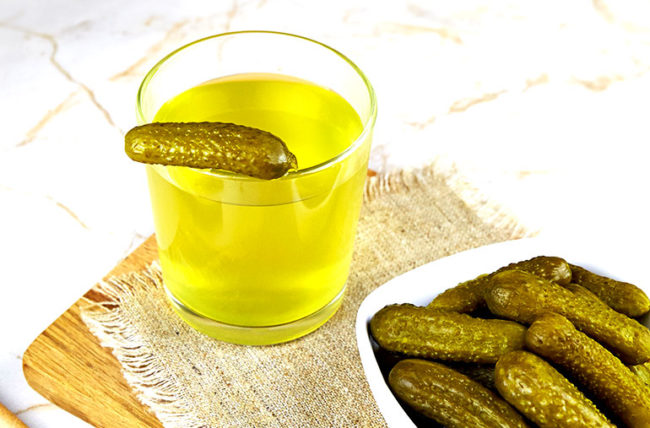People have considered pickles to be a health food for centuries, and some claim that pickle juice has its own benefits. What does the research say?
Many people believe that drinking pickle juice is good for the body. Some claim, for example, that it might enhance exercise performance or help control blood sugar. However, it is very high in sodium. This article looks at the research behind the health effects of pickles and pickle juice.
What is Pickle Juice?
According to the New York Food Museum, records of pickles date back to 2030 B.C., when travelers from India helped start a custom of preserving cucumbers in the Tigris Valley.
Pickling cucumbers requires three main ingredients: cucumbers, salt, and water.
Lactobacillus bacteria, which normally cover the vegetable’s skin, can ferment the cucumber. However, commercial manufacturers usually remove these beneficial probiotic bacteria during processing and add vinegar instead.
After several weeks of curing, the cucumbers have transformed into pickles and are ready to eat. The juice is what surrounds the pickles in the jar.
Bottom line: Pickling is a simple way to preserve cucumbers and other foods, using salt, water, and sometimes vinegar.
Nutrition
Around 3.5 ounces (oz) of pickle juice contains the following nutrients:
- carbohydrates: 0.4 grams
- calcium: 1–5% of the recommended dietary intake RDI
- sodium: 50–115% of the RDI
- potassium: 3% of the RDI
- magnesium: 3% of the RDI
Also, unpasteurized pickle juice, without vinegar, may contain significant amounts of probiotic bacteria. However, most commercial varieties of pickle juice are pasteurized.
Bottom line: Pickle juice contains trace amounts of carbs, minerals, and sometimes probiotic bacteria. It is also very high in Sodium.
Benefits
Many sources claim that pickle juice could have health benefits. Below are a few of the most common claims and what the research has to say:
Claim: Pickle juice benefits sports performance
Some people think that the high sodium content of pickle juice can increase hydration before workouts and improve performance.
However, studies have arrived at mixed results.
In a 2014 study, for example, participants consumed 3 oz of pickle juice per 100 pounds of body weight before exercising. The juice had no effect on running performance, sweat rate, or body temperature.
Meanwhile, some people think that drinking pickle juice after exercise has health benefits.
While some studies have shown that drinking the juice helps increase water intake and blood levels of sodium after exercise, others have found no effects.
Bottom line: Small amounts of pickle juice are unlikely to have significant effects on exercise performance.
Claim: Pickle juice cures muscle cramps
A study from 2010 found that muscle cramps could be resolved in 1.5 minutes by drinking 1.5 oz of pickle juice for every 100 lb of body weight.
Also, the recovery was 45% faster after drinking the juice than after drinking no liquid at all.
The researchers suggested that something in the pickle juice might trigger a reflex in the mouth, sending a signal to the nerves to stop cramping.
However, confirming this effect will require more research.
Bottom line: Evidence suggests that pickle juice might help relieve muscle cramps, but more research is needed.
Claim: Pickle juice lessens stomach pain
Vinegar is a popular home remedy for an upset stomach. It also happens to be a prime ingredient in many commercially produced pickles.
According to anecdotal evidence, a glass of pickle juice may help relieve stomach pain. If this is true, the juice may have this effect when the pain results from low stomach acid production, a condition called hypochlorhydria.
In these cases, the acidity of pickle juice may help restore stomach acidity to a healthy level.
However, anyone with an ulcer should not try this remedy — and there is no scientific evidence of its effectiveness.
Bottom line: There is no scientific evidence that pickle juice can relieve stomach pain.
Claim: Pickle juice cures hangovers
Hangovers are partially caused by dehydration, and the salt in pickle juice may encourage people to drink more water.
There is no scientific evidence that pickle juice would be more effective than any other salty drink. That said, trying this remedy is likely not harmful.
Bottom line: Pickle juice may encourage people to drink more water, which can help relieve a hangover, but no studies support this home remedy.
Claim: Pickle juice soothes sunburns
Pickle juice is also a popular remedy for sunburns.
Some people apply the juice directly to the skin or soak paper in the juice and lay the paper on the area of sunburn.
Yet, as with many other folk remedies, no scientific research has investigated the effectiveness of this remedy.
Bottom line: Despite a lack of scientific research, pickle juice remains a popular home remedy for sunburns.
Claim: Pickle juice relieves period cramps
No research has investigated whether pickle juice reduces menstrual cramps, specifically. However, it may ease period cramps in the same way that it soothes other types of cramps.
The very high level of sodium in pickle juice may also help reduce any cravings for salty foods, which some people experience before or during their periods.
Bottom line: Pickle juice may help relieve menstrual cramps in the same way that it eases cramps from exercise, but no research has confirmed this.
Claim: Pickle juice fights disease
Some sources claim that pickle juice may boost digestion and immune function, while reducing the risk of cancer and heart disease.
Such health claims are dubious. That said, the benefits, if any, might be due to antioxidants and probiotics in pickle juice.
Still, while it is possible that the juice could have an antioxidant effect, no research into the antioxidant content of pickle juice exists.
When it comes to probiotics, pickled vegetables that are cured in vinegar may taste good, but they are likely sterile — containing no healthful bacteria.
Only fermented, unpasteurized pickles contain beneficial bacteria. Fermented pickles are stocked in the refrigerated food section of the grocery store, while the unrefrigerated shelf is more likely to have vinegar-preserved pickles.
However, even fermented pickles do not pack the probiotic punch that yogurt and other probiotic foods do.
Plus, a person would have to drink many glasses of pickle juice per day to reach a therapeutic dose.
Bottom line: Pickle juice could contain antioxidants and probiotics, but there is little evidence of it. There is no scientific evidence that pickle juice protects against disease.
Claim: Pickle juice helps control blood sugar
Chronically elevated blood sugar can lead to type 2 diabetes and a wide array of other chronic diseases.
Interestingly, the vinegar in commercially prepared pickle juice may help lower blood sugar levels.
Research shows that vinegar can improve the body’s response to insulin and significantly reduce blood sugar after meals.
However, if a person is taking medication that lowers their blood sugar, they should check with their doctor before drinking pickle juice.
Bottom line: Pickle juice that contains vinegar may help limit a rise in blood sugar after eating.
Side Effects
While it could have some health benefits, pickle juice is not for everyone.
Here are some factors to consider before adding it to the diet:
- High sodium: Too much salt can lead to water retention, swelling, and bloating.
- Raised blood pressure: Water retention from eating large amounts of salt can increase blood pressure.
- Indigestion: Drinking too much pickle juice can lead to gas, stomach pain, and diarrhea.
- Cramping: Some doctors worry that drinking pickle juice may actually cause electrolyte imbalances and worsen cramping. However, studies do not support this.
Bottom line: Drinking pickle juice is generally safe, though it may be a good idea to discuss the risks with a doctor before trying it.
Summary
Research indicates that pickle juice may help soothe cramps and keep blood sugar levels in check.
However, there is no evidence that these advantages are exclusive to pickle juice. Juice from a jar of olives or pickled peppers, for example, may provide the same health benefits.
Regarding other health claims about pickle juice, the evidence is anecdotal at best.
Anyone who wishes to try pickle juice can drink it from a jar of pickles or buy the juice online.






